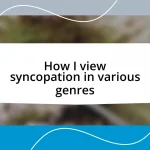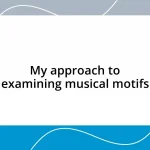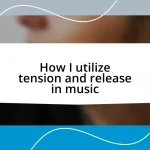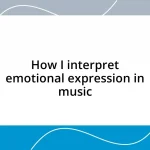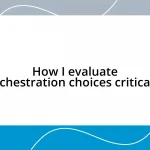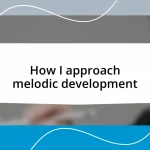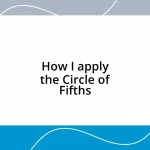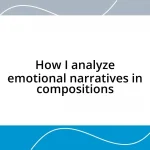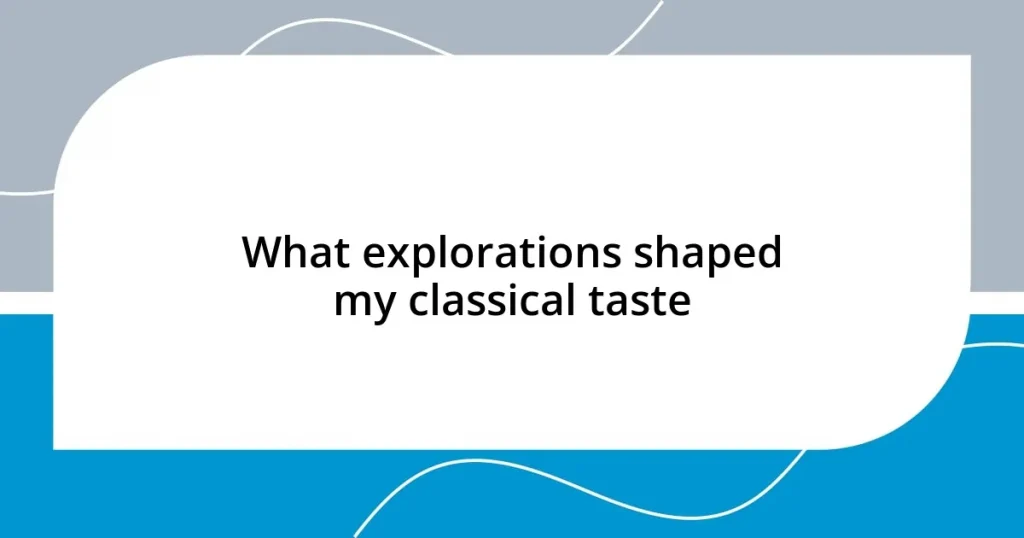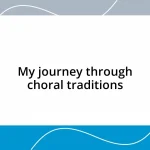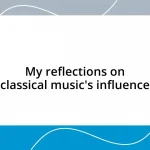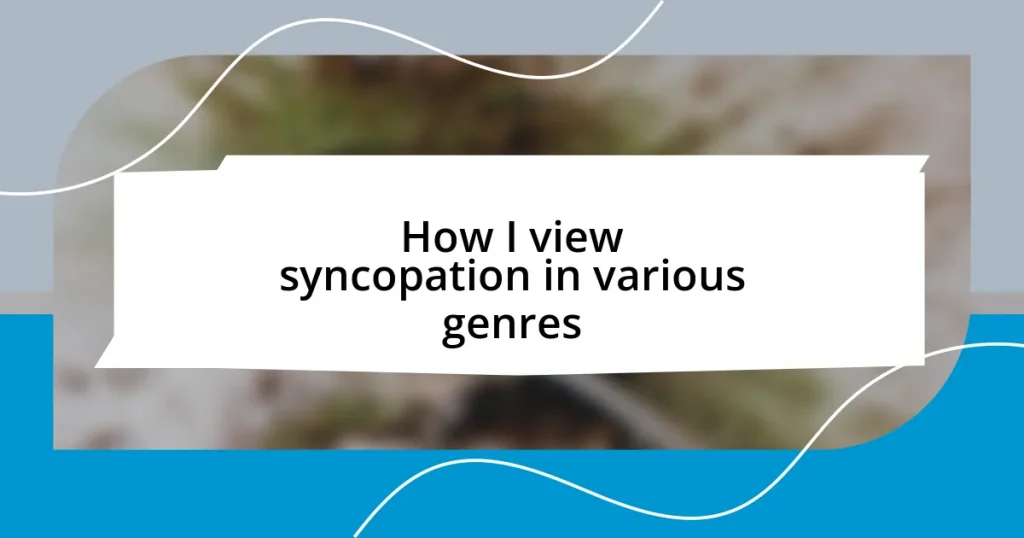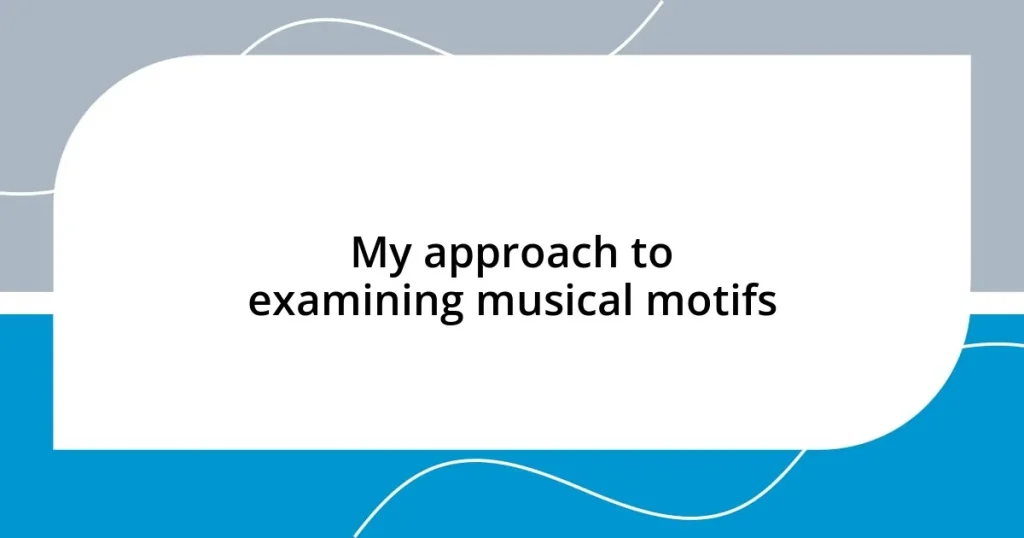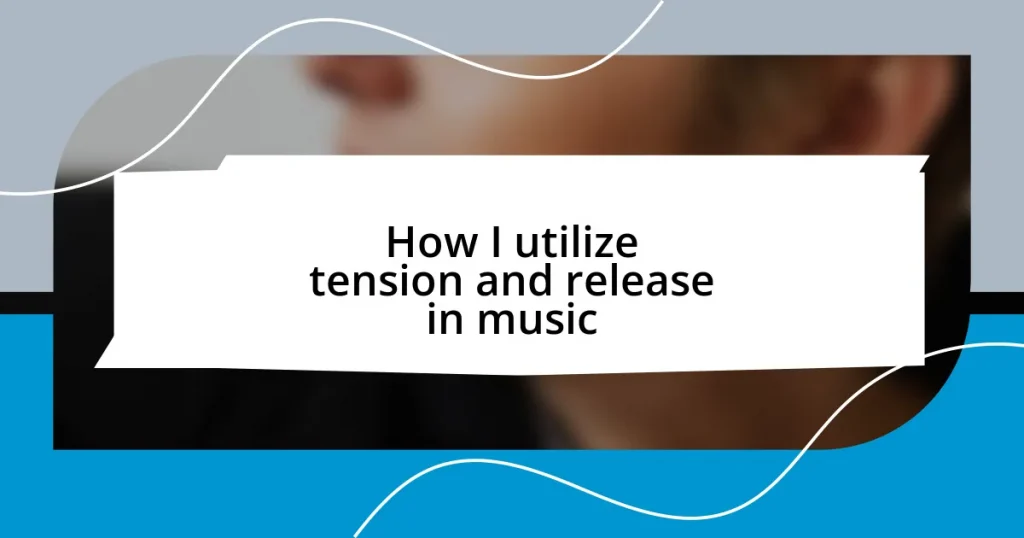Key takeaways:
- First exposure to classical music through Vivaldi’s “Four Seasons” instilled a deep emotional connection.
- Significant performances, such as Mahler’s Symphony No. 5 and Yo-Yo Ma’s Dvorak Cello Concerto, reinforced the communal power of live music.
- Music education provided critical insights, revealing the emotional layers in compositions and enhancing appreciation.
- Exploration of diverse composers, including contemporary and lesser-known artists, broadened musical taste and sparked advocacy for broader representation in classical music.
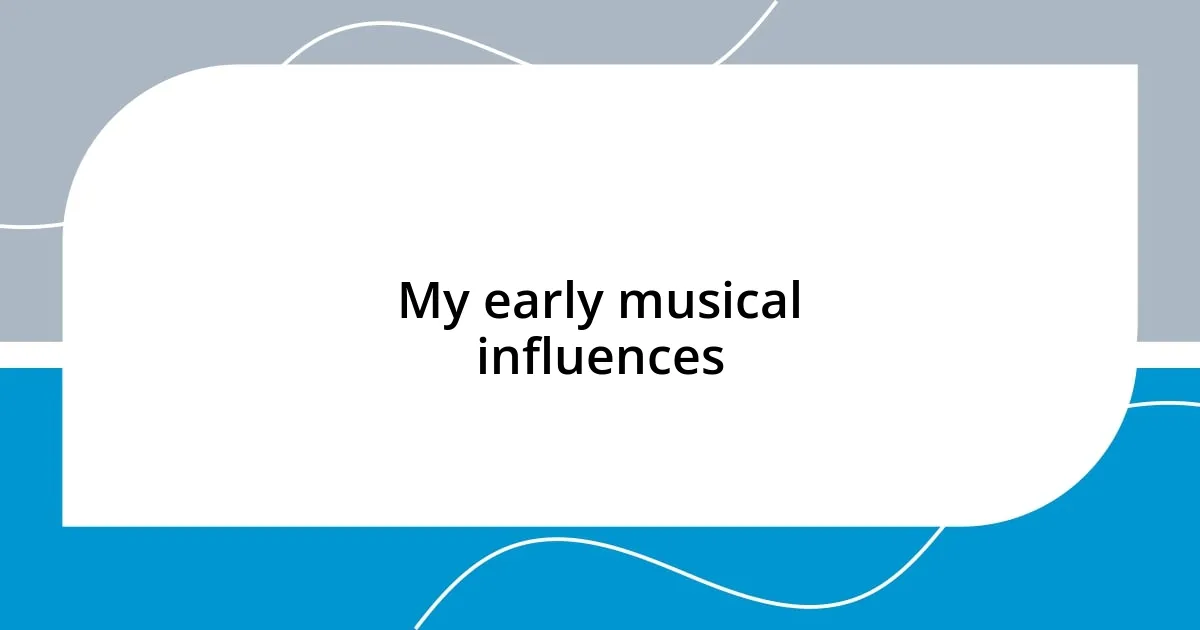
My early musical influences
Thinking back to my childhood, I can pinpoint the moment classical music truly entered my heart. It was a Sunday afternoon, and my mother played a vinyl record of Vivaldi’s “Four Seasons.” The vivid emotions each piece invoked—especially in “Spring”—made me feel a sense of joy that I hadn’t experienced before. Can a single composition really transport you to another world? For me, it did.
As I grew older, my exposure began to widen with the discovery of different composers. Attending live performances at the local symphony was a mesmerizing experience; I vividly recall my first time hearing Tchaikovsky’s “Swan Lake.” The elegance of the dancers and the stirring score intertwined to create a magic that left me awe-inspired. I remember whispering to my friend, “How can something so beautiful exist?” It was a question that resonated deeply, sparking a passion that would only grow.
Later, in high school, I stumbled upon a recording of Beethoven’s symphonies. The more I listened, the more I realized how his music mirrored the complexity of human emotion. I can almost recall the lightbulb moment when I connected my own struggles with the intensity of his “Moonlight Sonata.” Isn’t it fascinating how music can articulate feelings we sometimes can’t express? Those early influences weren’t just sounds to me; they shaped my identity and understanding of the world.
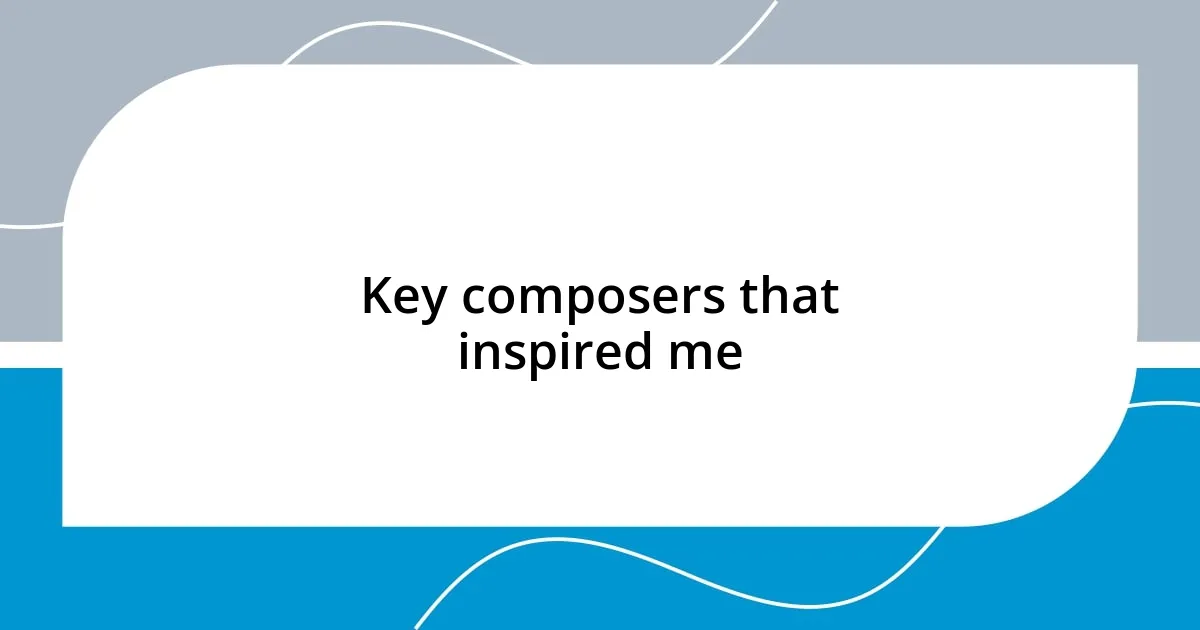
Key composers that inspired me
Mozart was one of those composers who captured my imagination in a way I never expected. The clarity and brilliance of his melodies felt like sunlight breaking through clouds on a gloomy day. I vividly remember my first listen to “Eine kleine Nachtmusik.” It was during a summer picnic with friends. As the notes danced around us, I couldn’t help but smile, feeling a sense of lightness that was infectious. Have you ever felt a piece of music brighten your day so instantly? For me, that was a quintessential Mozart experience.
Then there’s Debussy, whose work opened a whole new world of color and texture in music for me. I stumbled upon “Clair de Lune” during a quiet moment, just me and the early morning light streaming through the window. Each note painted a picture, evoking memories of serene moonlit nights. I often find myself returning to this piece whenever I need to unwind. It’s remarkable how a simple piano melody can evoke such deep tranquility, isn’t it? Debussy taught me that music could go beyond structure— it could express emotions as fluidly as water.
Lastly, I can’t overlook Stravinsky’s “The Firebird.” The first time I heard that exhilarating opening, my heart raced with excitement. I was attending a concert where the energy in the room was palpable. As the orchestra launched into the vibrant rhythms, it felt like I was on a wild adventure through a fantastical landscape. That feeling— the thrill of the unexpected— has stayed with me ever since. Stravinsky’s innovative spirit inspires me to always embrace the unconventional in music and in life.
| Composer | Signature Work |
|---|---|
| Mozart | Eine kleine Nachtmusik |
| Debussy | Clair de Lune |
| Stravinsky | The Firebird |
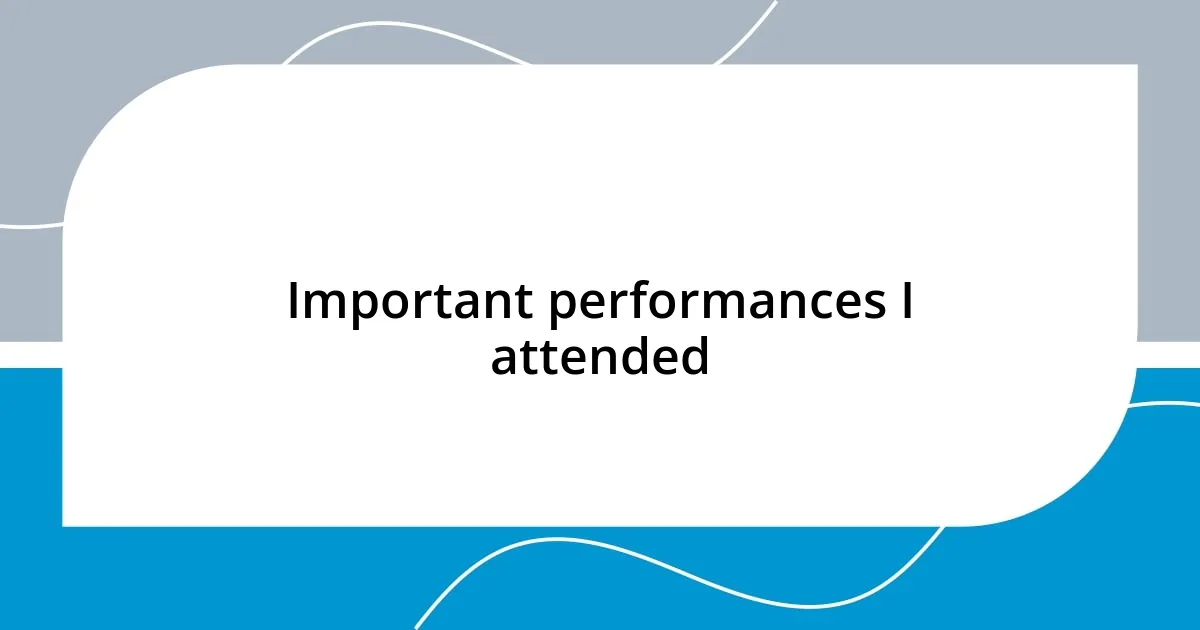
Important performances I attended
I can still vividly recall the concert hall’s grandeur when I attended a performance of Mahler’s Symphony No. 5. The deep, resonant strings and the passionate brass left me utterly captivated. I remember sitting on the edge of my seat, my heart racing during the Adagietto, feeling every note wash over me like a warm tide. It was as if Mahler was speaking directly to my soul, guiding me through every peak and valley of emotions. This piece made me realize how powerful live music could be; it’s an experience that etched itself into my memory.
- Attended Mahler’s Symphony No. 5 at the city concert hall
- Felt an intense emotional connection during the Adagietto
- Remember the stirring finale that left me breathless
Another notable performance was when I saw Yo-Yo Ma play the Dvorak Cello Concerto. Watching him at work was like witnessing pure artistry in action. His expressive playing captured the raw beauty of Dvorak’s music in a way that made everything else fade away. I noticed the audience’s collective intake of breath during the soaring melodies—a moment of shared awe. It struck me then that, through his instrument, he was communicating something profound, transcending words entirely. That evening reinforced my belief that great performances go beyond mere notes; they create a shared experience that resonates with us long after the final bow.
- Experience hearing Yo-Yo Ma play Dvorak’s Cello Concerto
- Audience silence during his expressive passages
- Realized how live performances foster a communal connection
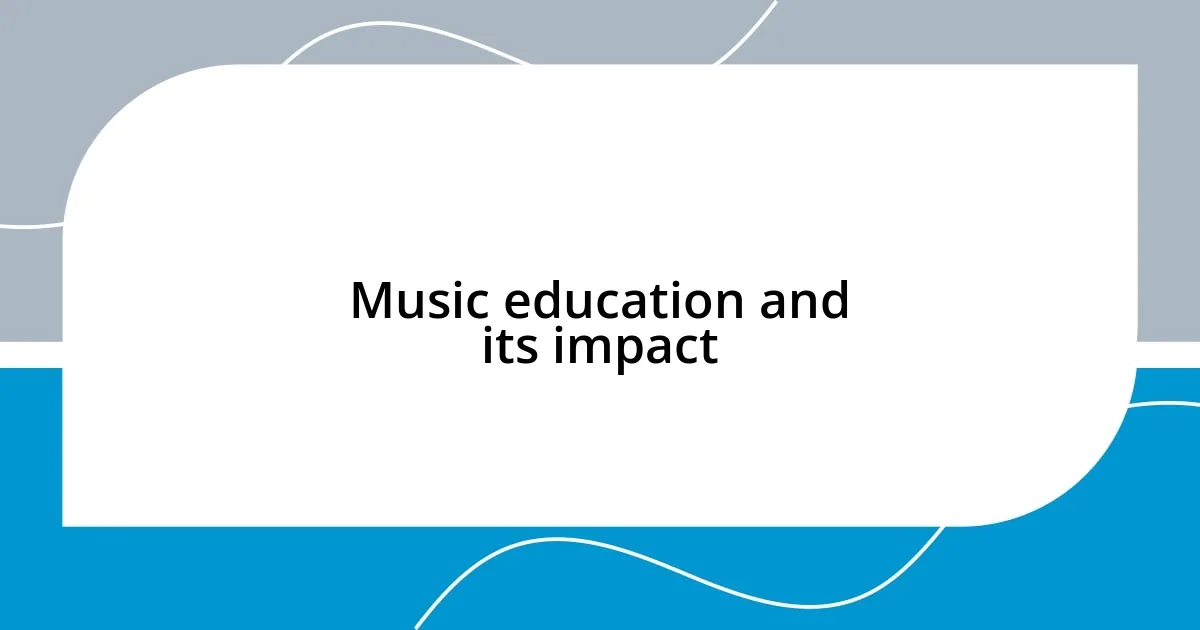
Music education and its impact
Music education holds a transformative power that often shapes our appreciation of classical music in profound ways. I remember my own experience in music classes; early on, I was challenged to listen critically and analyze different compositions. This wasn’t just about understanding notes on a page; it opened my eyes to the intricate emotions behind each movement, making me realize how deeply music could resonate with our personal experiences.
Attending workshops where we dissected works by composers like Beethoven and Brahms left lasting impressions on me. I can still recall the excitement of tackling the complexities of a symphony, feeling like I was unraveling a mystery with each lesson. It’s amazing how studying the context and historical significance of music can deepen one’s appreciation. Have you ever found yourself suddenly connecting with a piece after learning about its background? That’s the kind of enlightenment I wish everyone could experience, as it adds layers to our listening experience.
Moreover, participating in ensemble performances taught me the value of collaboration in music. I recall the first time I played in a chamber group; the magic of blending individual sounds into a harmonious whole was exhilarating. It struck me how each musician’s interpretation brought something unique to the table, echoing the idea that our differences enrich the music we create together. This understanding of collective expression has greatly influenced my taste, as I now seek out performances that celebrate this shared journey through sound.
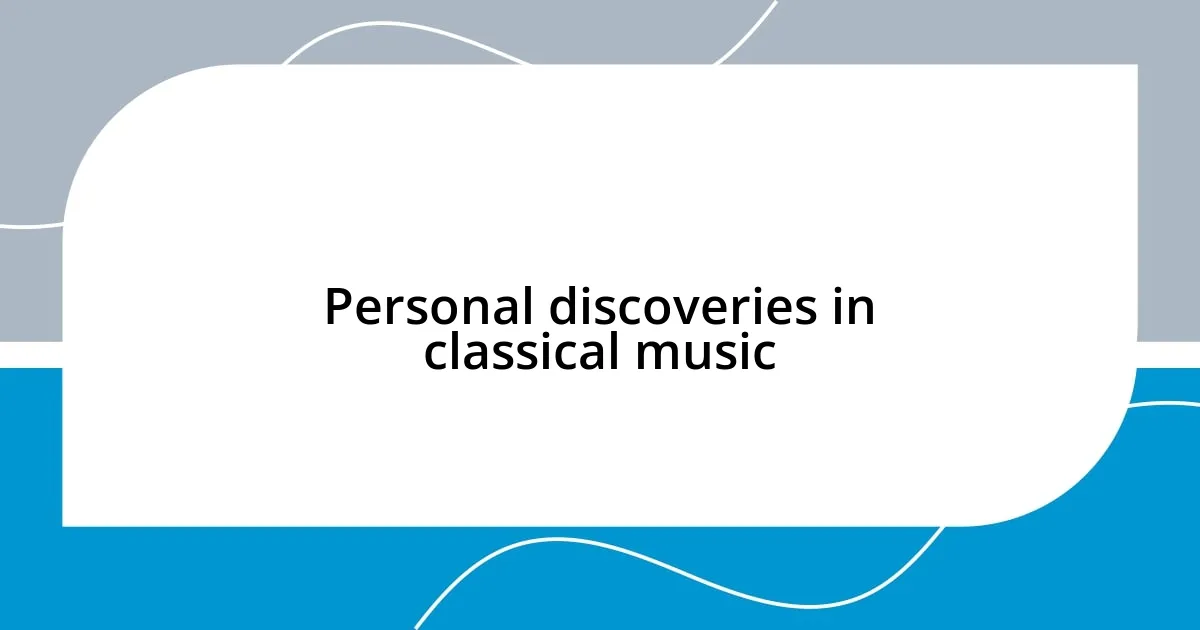
Personal discoveries in classical music
One of my most eye-opening personal discoveries in classical music happened while I was exploring the works of Debussy. I vividly remember hearing “Clair de Lune” for the first time while trying to relax after a long day. The soft, flowing melodies wrapped around me like a warm blanket. It made me wonder—how can a collection of notes evoke such a serene atmosphere? This piece opened my ears to the world of impressionist music, where feelings and colors are painted through sound rather than the rigidity of classical forms.
Another pivotal moment in my musical journey was during a late-night listening session with Stravinsky’s “The Firebird.” I was entranced by the boldness of the orchestration. Each burst of sound felt like a firework display in my mind. I still remember my heart racing with anticipation as the tension built, leading to the breathtaking finale. It made me realize the power of storytelling in music. Isn’t it fascinating how composers can create a vivid narrative without using words? This experience has fueled my passion for seeking out pieces that tell a story, igniting my imagination with every listen.
Finally, I discovered my affinity for chamber music during a visit to a local concert featuring a string quartet. The intimacy of the performance provided a stark contrast to the grandiose nature of symphonic works. I was struck by the subtle dynamics and the intricate interplay between musicians. It felt like eavesdropping on a deeply personal conversation. I often ask myself—how can such a small ensemble convey so much emotion? That evening left an indelible mark on my musical taste, making me appreciate the nuanced dialogues that can unfold within the confines of a handful of instruments.
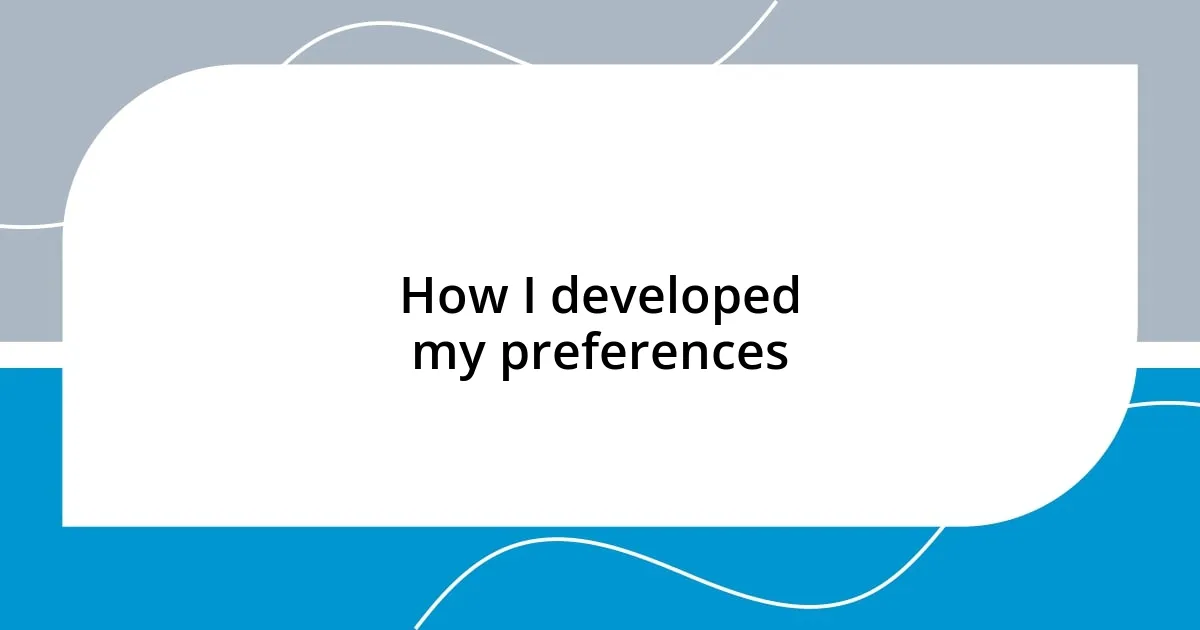
How I developed my preferences
Exploring classical music has been more than just a listening experience for me; it has been a journey of personal growth and discovery. I vividly remember the first time I stumbled across a recording of Mahler’s Fifth Symphony. As the first movement unfolded, I felt a rush of emotions that caught me off guard. The way the music swelled and receded spoke to my own joys and struggles in life. Have you ever felt a piece of music reflect your own feelings so accurately? It was in that moment that I realized how deeply connected I could become with these compositions, and it sparked my desire to seek out music that echoed my own experiences.
My preferences also evolved through encounters with diverse performances. Attending a live concert of Vivaldi’s “The Four Seasons” was transformative. Watching the musicians perform so passionately brought a new dimension to the music; it felt alive and electric in a way I had never experienced through recordings alone. I can still picture the dynamic gestures of the violinist as they embodied the changing seasons. That experience made me wonder: how does the atmosphere of a live performance influence our understanding of the music? It opened my eyes to the fact that the context in which I experience music plays a crucial role in shaping my taste.
In recent years, I’ve delved into lesser-known composers and their works. For instance, I became mesmerized by the compositions of Samuel Coleridge-Taylor after reading about his contributions to classical music. I found listening to his pieces particularly compelling because they tell stories that resonate with themes of identity and cultural heritage. I often ask myself—why are certain voices in classical music overlooked? This exploration of forgotten or underrepresented composers has not only enriched my musical palette but also encouraged me to advocate for a broader understanding and appreciation of classical music’s diversity.
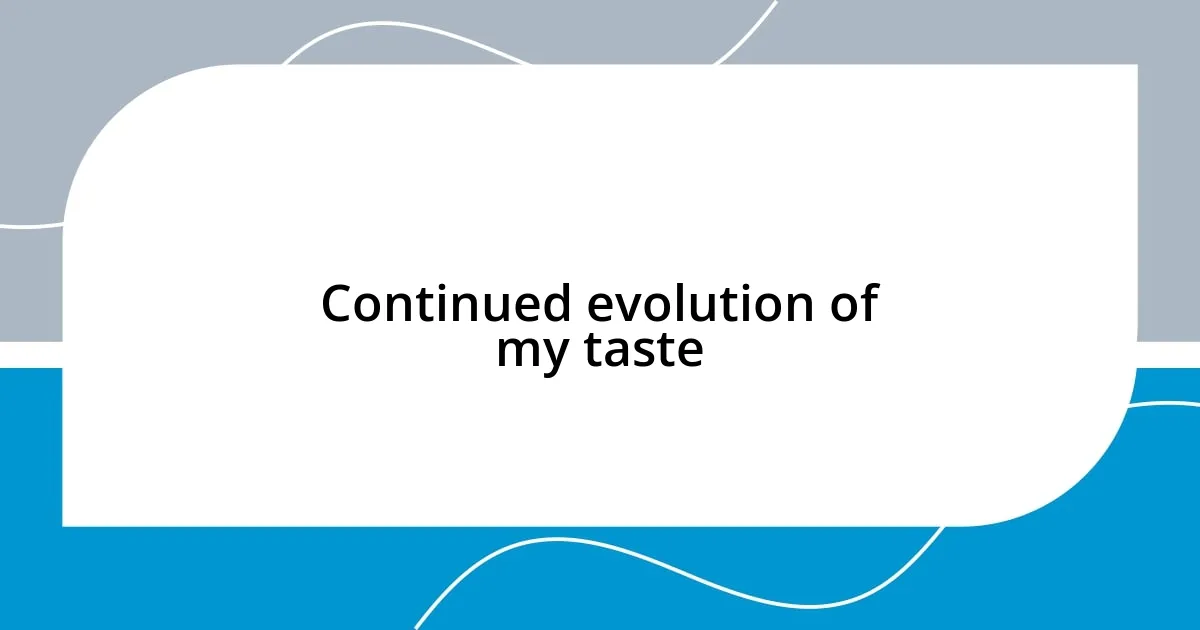
Continued evolution of my taste
The continued evolution of my taste in classical music has surfaced new layers of appreciation that I never anticipated. Recently, while delving into contemporary composers, I found myself captivated by the unique textures in the works of Arvo Pärt. Hearing “Spiegel im Spiegel” for the first time felt like peeling away the chaos of daily life, revealing a tranquil essence beneath. I remember sitting in a quiet room, completely absorbed, as the repeated patterns created a meditative space. Isn’t it incredible how music can transform our state of mind?
As I ventured further, I began to notice how cultural contexts influence the music I connect with. My immersion in Indian classical music introduced me to the concept of raga. I was fascinated by how different ragas evoke specific emotions at various times of day. After attending a workshop, I realized that each performance was not just about the notes played but also about the intention behind them. This made me question—how can such diverse musical traditions shape our overall understanding of classical music? With each exploration, I uncover threads that bind different cultures, enriching my own listening experience.
Moreover, I’ve discovered that my taste continues to mature with my personal experiences and insights about life. During a reflective evening, I revisited Beethoven’s late string quartets. Each piece seemed to echo my own journey of grappling with complexity and resolution. I found myself pausing, absorbing the raw intensity and vulnerability. I often ponder—how does my life phase influence my perception of these compositions? This emotional resonance has opened doors to music that feels intimately tied to my own story, leading to an ever-deepening relationship with the classical repertoire.

